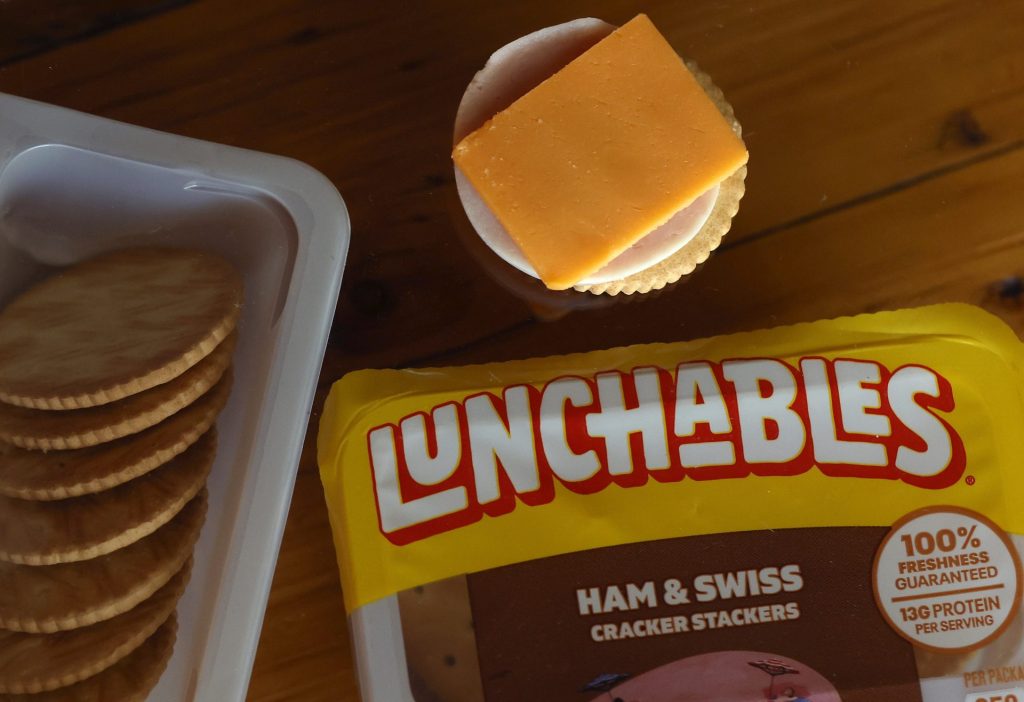
Consumer Reports is calling on the United States Department of Agriculture (USDA) to remove Lunchable meal kits from school menus.
RELATED: FDA Recalls Frozen Strawberries Linked To Recent Hepatitis A “Outbreak”
More Details Regarding The Findings Related To Lunchables
According to a report published by the consumer advocacy group on Tuesday, April 9, tests ran on “12 store-bought versions of Lunchables and similar kits” revealed that they contain “relatively high levels of lead, cadmium, and sodium.”
Additionally, the group discovered that Lunchable kits served in schools contain “even higher levels of sodium” than those sold in grocery stores.
Consumer Reports that out of the 12 kits tested, only one didn’t test positive for phthalates. Furthermore, the organization notes that phthalates are the “chemicals found in plastic.” Phthalates have reportedly been “linked to reproductive problems, diabetes, and certain cancers.”
According to the report, the kit that didn’t test positive for phthalates was the Lunchables Extra Cheesy Pizza.
Here’s Why The Meal Kit Should Reportedly Be Removed From School Menus
Brian Ronholm, the director of food policy at Consumer Reports, shared a statement about why Lunchables should be removed from school menus.
“Lunchables are not a healthy option for kids and shouldn’t be allowed on the menu as part of the National School Lunch Program,” Ronholm asserted. “The Lunchables and similar lunch kits we tested contain concerning levels of sodium and harmful chemicals that can lead to serious health problems over time. The USDA should remove Lunchables from the National School Lunch Program and ensure that kids in schools have healthier options.”
The report explains that the USDA currently allows two Lunchable kits to be served in schools. The kits reportedly include the Turkey & Cheddar Cracker Stackers and Extra Cheesy Pizza.
Furthermore, Consumer Reports adds that the kits are served to almost 30 million kids “through the National School Lunch Program.” Additionally, the organization notes that sodium levels in the kits range from “460 to 740 milligrams per serving.
The level is reportedly “nearly a quarter to half of a child’s daily recommended limit for sodium.”
The report states, “The school version of the Turkey and Cheddar Lunchable contained 930 mg of sodium compared to 740 mg in the store-bought version. Similarly, the Lunchable pizza kit for schools had 700 mg of sodium compared to 510 mg in the store version.”
Lastly, the report notes that eating foods with high sodium “can lead to high blood pressure and lead to hypertension.” Children who intake higher levels of sodium “are about 40 percent more likely to develop hypertension.”
Furthermore, Consumer Reports notes that hypertension is a “risk factor for heart disease, stroke, and kidney damage.”
Consumer Reports Take Action As Lunchables & The USDA Shares Statement
Ultimately, the organization has launched a petition encouraging the USDA to take action and remove meal kits from school menus. To date, the campaign has received over 15,000 signatures.
Furthermore, the group is striving to garner over 25,000 signatures.
According to PEOPLE, a spokesperson for Lunchables has issued a statement defending the nutritional quality of the meal kits.
“All our foods meet strict safety standards that we happily feed to our own families. We are proud of Lunchables and stand by the quality and integrity that goes into making them,” the statement reads. “According to current science, processed foods arbitrarily classified as ‘ultra-processed’ are not necessarily less nutritious. In fact, many processed foods contain added nutrients, providing even more benefits to the consumer. The classification of foods should be based on scientific evidence that includes an assessment of the nutritional value of the whole product, not restricted to one element such as a single ingredient or the level of processing.”
Additionally, the USDA shared a statement with the outlet.
“USDA takes very seriously our responsibility to ensure school meals are of the highest nutritional quality,” the statement reads. “…Importantly, USDA doesn’t allow or disallow individual food items. Our requirements address the overall content of meals – some of them on a daily basis and others on a weekly basis. So, the Lunchables described in the article would need to be paired with fruit, vegetables, and milk. In addition, a school who wanted to serve a higher sodium product one day has to balance that with lower sodium items on others. Many schools are taking steps to use more scratch-cooked and local foods, and USDA has supported these efforts through expanded grants for equipment, training, and local food procurement.”
















